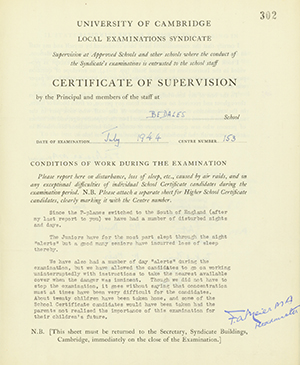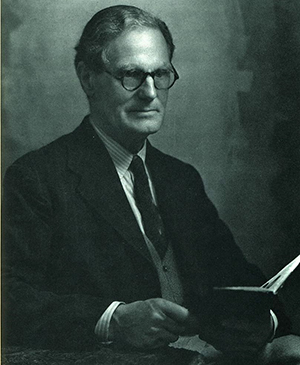As we mark the 75th anniversary of VE Day, our Group Archivist Gillian Cooke delved into the Cambridge Assessment Archives and Heritage to find out how our exams have been impacted in history, including during and after the Second World War, and whether there are any lessons to take forward into the situation we currently face with the global coronavirus pandemic.
In uncertain times, we like the comfort of looking back and using our history to remember how people managed a situation before, to see the footsteps we are following, and, if possible, to learn from past mistakes. But, for Cambridge Assessment, there is no precedent to the current situation, no time in our history when a whole series of UK and overseas examinations has been cancelled.
At the time of the First World War we were a tiny organisation which remained largely unaffected by the war; our candidate figures remained at just over 22,000 and even most overseas examinations were carried out successfully. However, in October 1918, having survived the war, the centres of Worthing and Petersfield closed and cancelled all entries for the December examination session due to the flu epidemic. The session went ahead but the so-called Spanish flu caused ten percent of candidates to be absent from the examinations. Subsequent cost cutting exercises resulted in the recruitment of women as examination invigilators (presiding examiners) and the sharing of examination rooms by boys and girls.
The Second World War had an impact unprecedented across the globe, and although the effect on our organisation was profound, again we continued to run examinations.
Early on, when the war appeared to be contained within Europe, it was decided to discontinue the overseas summer exams but the autumn series continued, and by 1945 we could still boast some 200 overseas centres and total candidate entry figures of over thirty-five thousand.
As hostilities increased, new emergency regulations were introduced and continually revised throughout the war; from the employment of overnight fire wardens to watch our buildings each night, to new regulations for the use and supply of paper, a crucial resource required for all our operations.
As with today, it is the human factor which is so poignant. Examinations were held during air raids for which centres submitted Certificates of Supervision, and some of these are held in our archives. They carry accounts from headteachers of adverse conditions endured by candidates during their exams, and all are deeply moving.
Some candidates took exams in shelters while others, whose homes had been damaged, attended exams without accommodation or changes of clothing but, as one headteacher explained ‘they were reluctant to single themselves out as undergoing special hardships.’

Certificate of Supervision from Cambridge Assessment's archives, completed in 1944 and submitted by Bedales School in Hampshire
Remarkably, not only did we continue to run school examinations in the UK throughout the Second World War, we also prepared for the introduction of new qualifications - the General Certificate of Education, (GCE O and A level) which was the first single subject qualification, and the First Certificate in English (initially called the Lower Certificate) were two enduring qualifications which were developed at that time.
Whilst we've never before experienced disruptions to exams like we have in 2020, not even during the war, this delve into our archives reminds us how we've coped during some of the most difficult and extraordinary circumstances in history and have come out stronger and more resilient.
Cambridge Assessment Archives and Heritage support learners by providing a rich resource of information about the development of school exams and educational assessment. We’ve a broad history dating back to 1858, when we were known as the University of Cambridge Local Examinations Syndicate (UCLES).
Many thanks to Bedales School who kindly provided Cambridge Assessment and OCR with several photographs for a recent exams officer update newsletter, including a portrait of Mr Meier (below) and the photograph of girls at Bedales School emerging from their air-raid shelter after a raid (top of page).

Mr Frederic Alfred Meier (Freddy) - Headmaster at Bedales School, Hampshire from 1935-46 - the signatory of the Certificate of Supervision